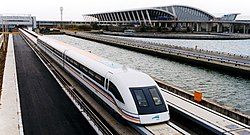Shanghai Maglev Train
 |
|

Maglev train coming out of the Pudong International Airport in Shanghai
|
|
| Overview | |
|---|---|
| Transit type | Magnetic levitation |
| Number of lines | 1 |
| Number of stations | 2 |
| Operation | |
| Began operation | 2004 (commercial) |
| Operator(s) | Shanghai Maglev Transportation Development Co., Ltd. |
| Technical | |
| System length | 30.5 km (18.95 mi) |
| Shanghai Maglev Train | |||||||||||
| Simplified Chinese | 上海磁浮示范运营线 | ||||||||||
|---|---|---|---|---|---|---|---|---|---|---|---|
| Traditional Chinese | 上海磁浮示範運營線 | ||||||||||
| Literal meaning | Shanghai Maglev Demonstration Operation Line | ||||||||||
|
|||||||||||
| Transcriptions | |
|---|---|
| Standard Mandarin | |
| Hanyu Pinyin | Shànghǎi Cífú Shìfàn Yùnyíng Xiàn |
| Wu | |
|
Shanghainese Romanization |
Zånhe Zyfoh Zyvhae Yiunin Si |
The Shanghai Maglev Train or Shanghai Transrapid (Chinese: 上海磁浮示范运营线) is a magnetic levitation train, or maglev line that operates in Shanghai, China. The line was the third commercially operated magnetic levitation line to open in history. It is the fastest commercial high-speed electric train in the world. The train line was designed to connect Shanghai Pudong International Airport and the outskirts of central Pudong where passengers could interchange to the Shanghai Metro to continue their trip to the city center. It cost $1.2 billion to build. The line's balance of payments has been in huge deficit since its opening. From 2004 to 2006, Shanghai Maglev Transportation Development Co.,Ltd, the company runs the line, had more than 1 billion RMB in losses. The line is not a part of the Shanghai Metro network, which operates its own service to Pudong Airport from central Shanghai and from Longyang Road Station.
The line runs from Longyang Road station in Pudong to Pudong International Airport; The Pudong International Airport station provides a transfer to Line 2, but the Longyang Road station provides access to Line 2, Line 7 and Line 16. At full speed, the journey takes 7 minutes and 20 seconds to complete the distance of 30 km (18.6 mi), although some trains in the early morning and late afternoon take about 50 seconds longer. A train can reach 350 km/h (217 mph) in 2 minutes, with the maximum normal operation speed of 431 km/h (268 mph) reached thereafter.
Hans-Dieter Bott, vice president of Siemens that won the contract to build the rail link, stated that "Transrapid views the Shanghai line, where the ride will last just eight minutes, largely as a sales tool. This serves as a demonstration for China to show that this works and can be used for longer distances, such as Shanghai to Beijing". However, the decision was eventually made to implement the Beijing–Shanghai High-Speed Railway with conventional high-speed technology. Plans for a shorter maglev extension from Longyang Road to Hangzhou, the Shanghai–Hangzhou Maglev Line, have been suspended.
...
Wikipedia
